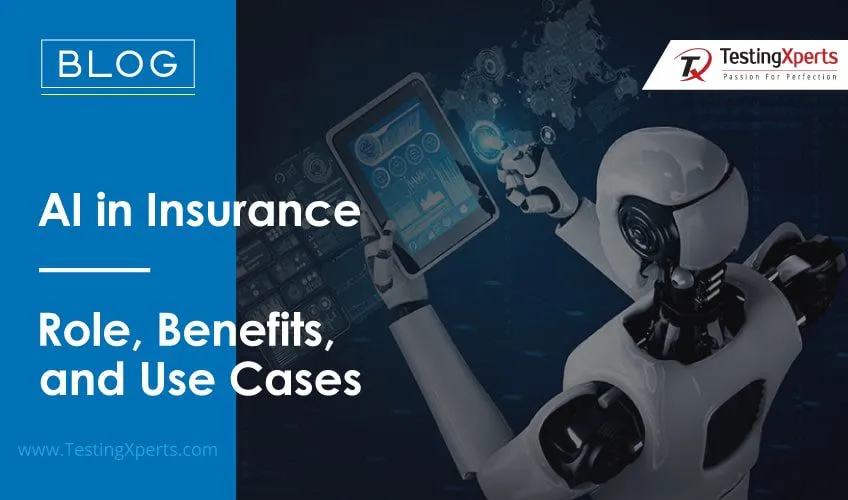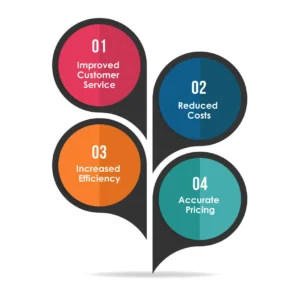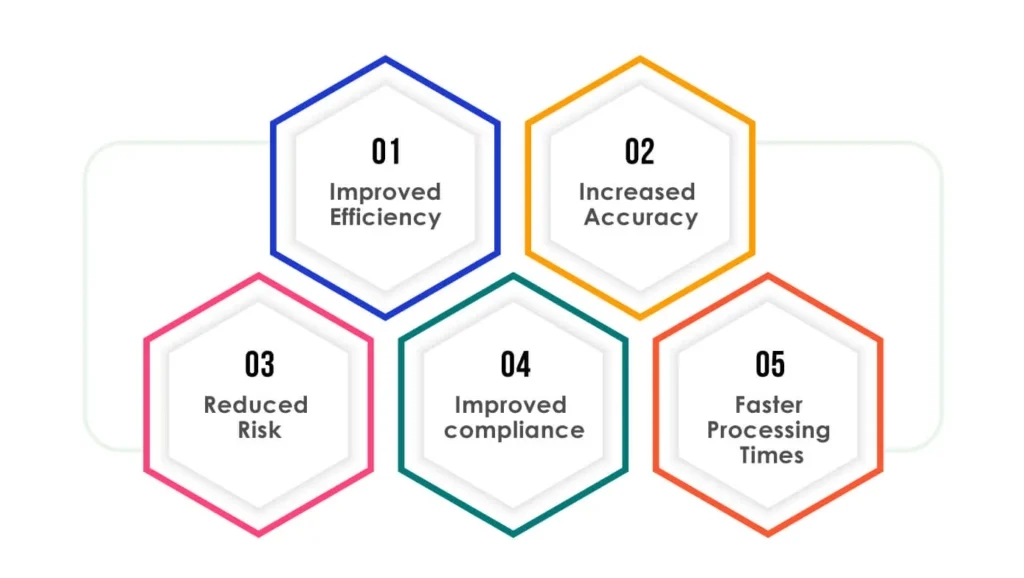Recommended Blogs
How are AI and RPA Modernizing the Insurance Ecosystem

Table of Contents
- The Current State of Insurance – A Quick Overview
- Importance of AI in Insurance
- Business Benefits of AI in Insurance
- Importance of RPA in Insurance
- Business Benefits of RPA in Insurance
- Role of AI and RPA in Modernizing the Insurance Ecosystem
- Conclusion
- How TestingXperts Helps Insurers with Effective AI and RPA Implementation
The Current State of Insurance – A Quick Overview
The insurance industry has been growing rapidly in recent years, driven by advancements in technology and changing customer expectations. Some of the latest trends in today’s insurance industry include the use of artificial intelligence and machine learning to underwrite and price policies, the adoption of telematics and IoT to gather data on customer behavior, and the increasing use of mobile apps and online platforms for purchasing and managing insurance policies.
A report by Statista states that the industry will grow at a compound rate of around 9% percent per year, reaching almost $8.4 trillion in 2026. Overall, the insurance industry is undergoing rapid change and is expected to continue to grow and evolve in the coming years.
Importance of AI in Insurance
AI has become an increasingly important tool for insurance businesses. It has helped revolutionize the insurance industry by providing more efficient, cost-effective, and accurate solutions. AI enables insurers to better understand customer behaviour and preferences, identify trends in data, automate processes, reduce fraud, and increase customer satisfaction.
By leveraging AI, insurers are now able to access large amounts of data quickly and accurately, allowing them to make more informed decisions about risk assessment and pricing. AI-driven algorithms help insurers analyze large datasets faster than ever before and make better decisions about risk management. This ability leads to improved profitability by reducing losses from claims or other risks. Additionally, AI helps identify fraudulent activities more quickly and accurately than manual processes.
AI also plays a role in automating various processes within the insurance industry such as underwriting and claims processing. Automation reduces costs associated with manual labour while increasing accuracy and efficiency. Moreover, AI-driven chatbots allow customers to resolve their queries quickly and without having to speak with a customer service representative.
Business Benefits of AI in Insurance

AI has numerous potential benefits for businesses in the Insurance sector, including the following:
Improved Customer Service:
AI can be used to provide customers with faster and more personalized service. Chatbots powered by AI can answer customer questions quickly and accurately, allowing them to get the information they need without having to wait for a human representative. Additionally, AI-powered analytics can help insurers better understand customer needs and tailor their services accordingly.
Reduced Costs:
AI-based systems require less manual labor than traditional methods of providing insurance services. This means that businesses in the Insurance sector can save money on labor costs while still providing high-quality service to their customers. Additionally, automated systems are more efficient than manual processes, which further reduces operational costs for insurers.
Increased Efficiency:
By using AI-based systems, insurers can process claims faster and more accurately than ever before. This allows insurers to provide quicker service to their customers while reducing overhead costs associated with manual processing. Additionally, automated systems are able to identify patterns in data that would otherwise go unnoticed by humans, allowing insurers to better predict future trends and adjust their strategies accordingly.
Accurate Pricing:
AI-based analytics allow insurers to better understand market trends and pricing dynamics so that they can set prices that accurately reflect customer needs and preferences. This helps ensure that customers are not overcharged for coverage or undercharged for riskier policies. Additionally, automated systems are able to identify fraud more quickly than manual processes, which helps reduce losses due to fraudulent claims or activities.
Importance of RPA in Insurance
RPA has the potential to revolutionize how insurance companies operate, by automating mundane, repetitive tasks and streamlining processes. This helps reduce costs, increase efficiency, and improve customer experience.
Insurers are able to respond quickly to changing market conditions and customer needs. By automating manual processes and reducing time-consuming paperwork, insurers can focus on more strategic initiatives that will help them better serve their customers. Additionally, RPA provides access to real-time data that can be used for analytics and predictive modeling. This data helps insurers make informed decisions about their products and services.
RPA also helps insurers with compliance requirements by automating routine checks of policies and procedures. This helps ensure that all regulatory requirements are met promptly, reducing the risk of costly fines or penalties due to non-compliance.
Business Benefits of RPA in Insurance

Here are the key business benefits that RPA can bring to Insurance:
Improved Efficiency:
RPA automates mundane and repetitive tasks, freeing up time for employees to focus on more complex tasks. This can help reduce operational costs and improve overall efficiency.
Increased Accuracy:
RPA eliminates human error by allowing machines to take over manual processes with greater accuracy and speed than humans can achieve. This can help reduce errors in data entry and other processes, resulting in better customer service and improved customer satisfaction.
Reduced Risk:
By automating processes, RPA reduces the risk of fraud or data breaches, as well as reducing the risk associated with manual processes such as paperwork errors or lost documents.
Improved Compliance:
RPA can help ensure that processes are followed consistently and in accordance with regulatory requirements.
accordingly – leading
Faster Processing Times:
By taking over manual tasks, RPA allows insurance companies to process data faster than ever before, enabling them to respond quickly to customer inquiries and provide timely solutions to their customers’ needs. This helps build trust with customers, which is essential for any successful business in the insurance industry.
Role of AI and RPA in Modernizing the Insurance Ecosystem
The integration of AI and RPA (Robotic Process Automation) into the insurance ecosystem is playing a crucial role in transforming the insurance industry. AI and RPA are providing insurance companies with the ability to automate repetitive tasks, improve customer experience, and streamline processes, ultimately leading to increased efficiency and cost savings.
The collective role of AI and RPA in the insurance ecosystem is invaluable. By automating mundane tasks and providing more personalized services through chatbots, these technologies can help insurers reduce costs while increasing efficiencies across the board.
In addition to this cost savings benefit, AI-based technologies are also helping insurers better understand their customers’ needs so they can tailor their products accordingly, leading to improved customer loyalty in the long run.
Conclusion
Every industry is reshuffling its business model to accommodate the paradigm shifts created by advancements in technology. It means that the insurance sector is no exception. Their most important need of the hour is the technology that helps them automate their current process flows.
AI and RPA are playing a crucial role in transforming the insurance ecosystem, providing insurers with the ability to automate repetitive tasks, improve customer experience, and streamline processes. This ultimately leads to increased efficiency and cost savings, and the ability to better compete in the ever-evolving insurance landscape.
How TestingXperts Helps Insurers with Effective AI and RPA Implementation?
TestingXperts (Tx) has extensive experience in the insurance industry, providing advanced and specialized QA and software testing services to its global clients. With deep knowledge of the insurance domain, our in-house AI accelerators and RPA-based automation frameworks ensure scalable and reliable insurance products. We strive to stay abreast of changes in the agile and DevOps projects within the insurance market while meeting regulatory compliances and delivering high-quality solutions for an improved customer experience (CX).
Our Range of Insurance QA Services Includes:
• Functional & Automated Testing
• Mobile App Testing
• RPA Testing With Bots
• Database Testing
• Integration Testing
• Accessibility Testing
• Usability Testing
• AI-Based Testing
• Performance Testing
• ETL Testing
• Insurance Test Center of Excellence (TCoE)
TestingXperts’ AI Testing Differentiators
• Expertise in using AI in Test Automation with partner tools and in-house accelerators
• Experienced teams in major tools to focus on intelligent automated continuous testing
• 30+ person-years of experience in using various tools for providing Intelligent Automation Solutions
• Extensive experience in enabling CI/CD pipeline using industry tools – based on Tx-DevOps accelerator
• 100+ Test consultants for next-gen tools
TestingXperts’ RPA Testing Differentiators
• Lesser maintenance effort with overall 30% cost savings
• Team of certified RPA testing professionals
• Experience in testing bots using the best methods and processes
• Assured quicker ROI with optimized bot performance
Discover more
